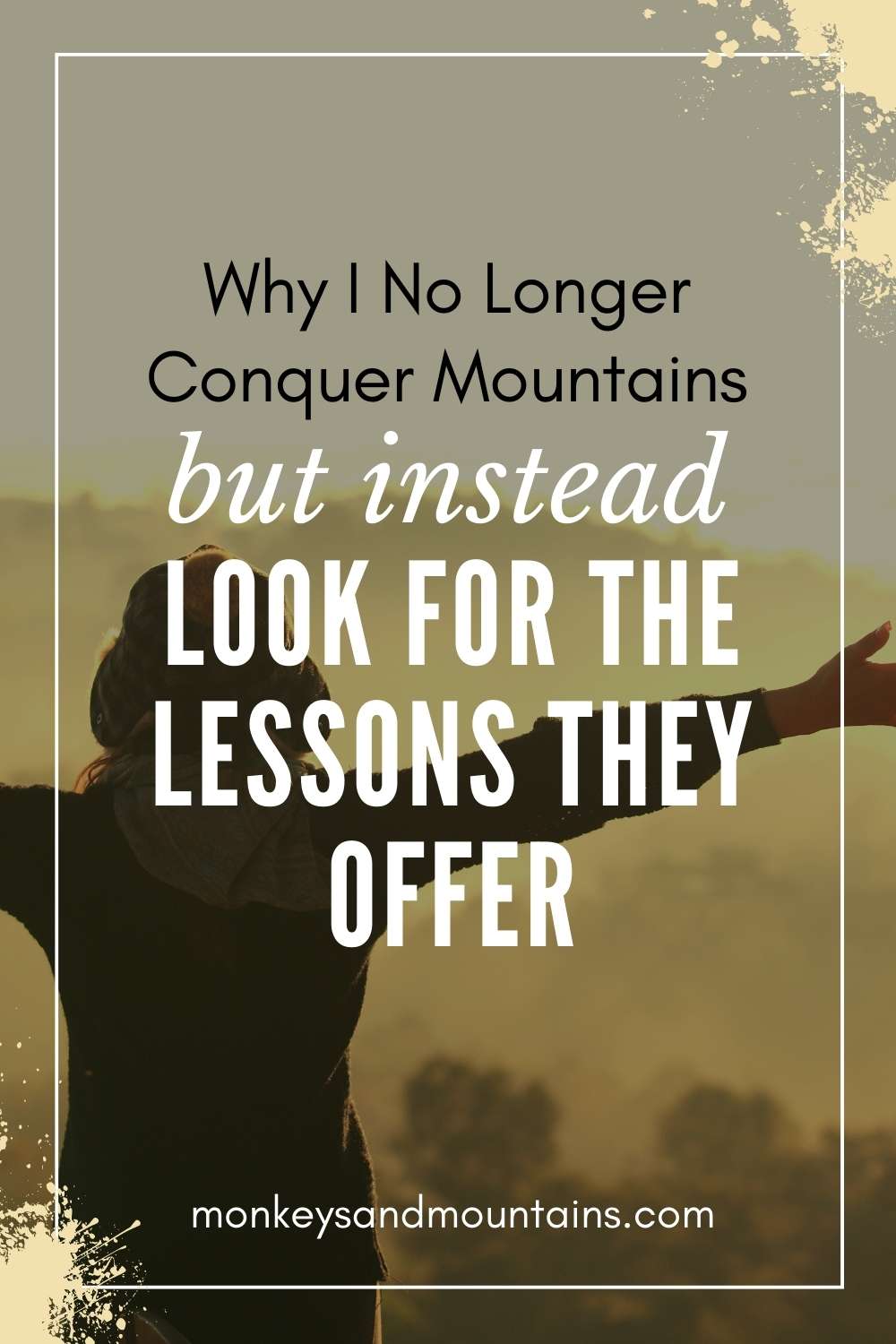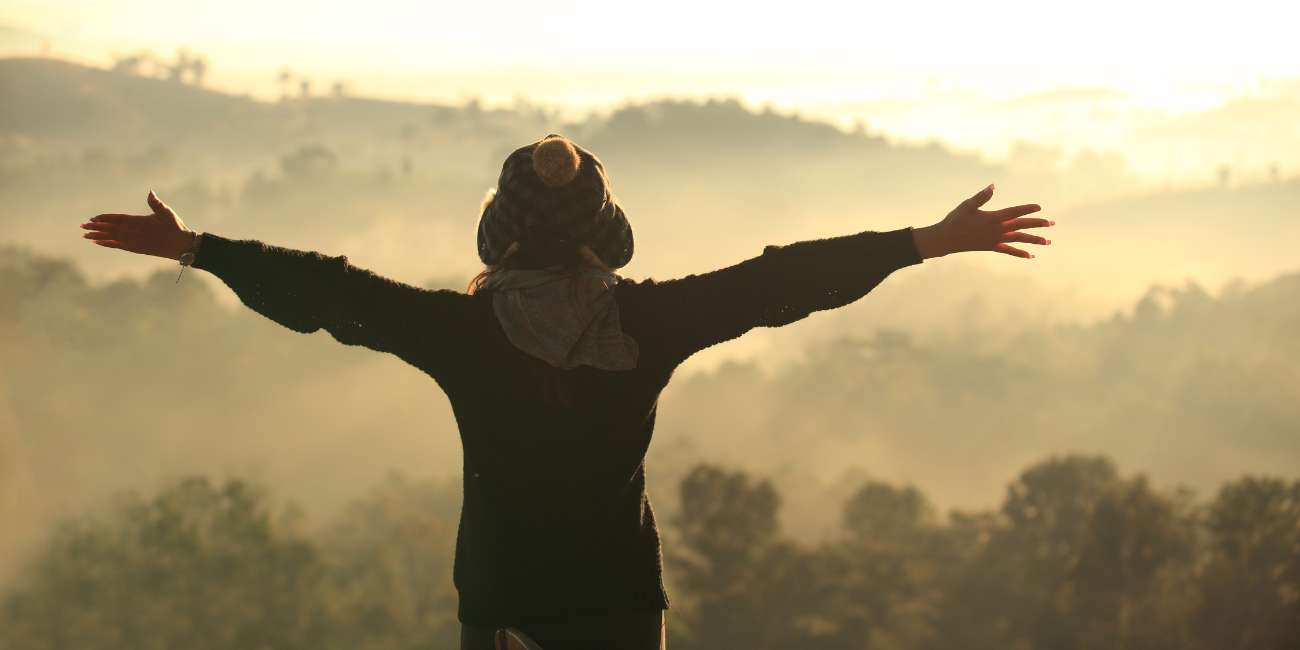When I first started over 20 years ago, I thought I was “conquering mountains.” As if I somehow claimed victory over the mountain simply by climbing it. It was only when I laid down my sword and realized that you can’t conquer mountains that I learned the real gifts that mountains offer.
My attitude t also influenced my hiking choices. I didn’t get the same satisfaction in hiking to a mountain lake, no matter how beautiful it was. There are no bragging rights from “conquering” a lake – even though hiking to some high alpine lakes can be more challenging than climbing some mountains.
I’d also race up the mountain, determined to be among the first ones if I was hiking with a group or determined to beat my previous time if I was hiking alone. Yes, I kept track and was proud if I was 7 minutes faster or feel defeated if I was slower.
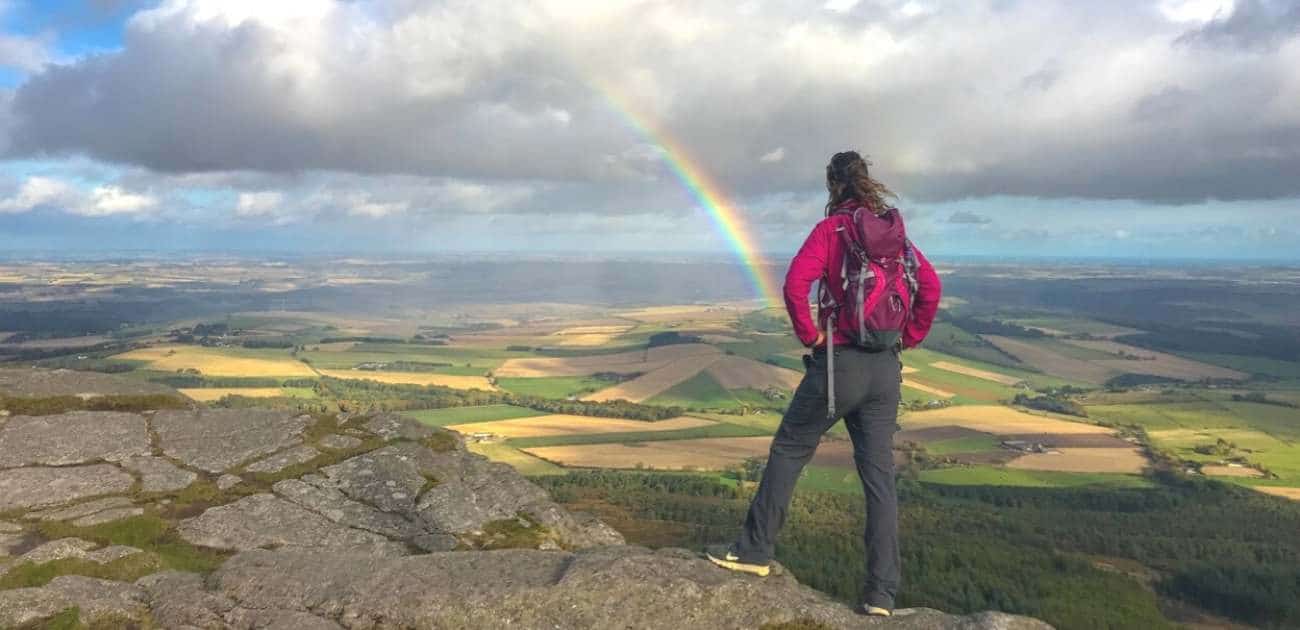
Being so competitive and looking to “win” also carried over to other areas of my life, particularly my career. While it did lead to a fairly fast career progression. It also left me burnt out, wondering, “Is this all there is to life? at the ripe old age of 31.
Going, going, going. Pushing, pushing, pushing, but yet, not really enjoying any of it.
Still, I kept climbing and conquering mountains.
That is until a knee injury that took ten months to get surgery for (the Canadian healthcare system is free but very slow for non-life-threatening treatments) left me craving mountains that I couldn’t climb no matter how slowly, let alone conquer.
I started going for drives into nature, to simply be in nature and sit and look up at the mountains that I couldn’t climb for the time being and foreseeable future. And felt my stress start to wash away.
Just sitting, I started to notice the smell of pine from the forest and was surprised to hear so many birds chirping so many kinds. They were all there before; I was just so focused on “conquering” the mountain that I missed them. With no mountain to conquer, I started to become present.
I think Sir Edmund Hillary said it best:
Table of Contents
It is not the mountains we conquer but ourselves.
who, along with Tenzing Norgay, were the first two people to reach Mount Everest in 1953 when asked about their climb.
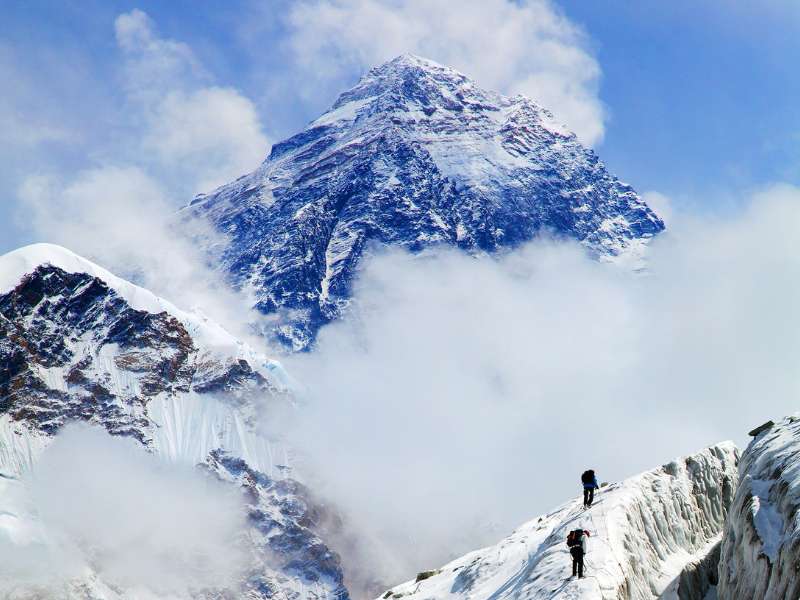
Now, if you climbed Mount Everest, you’d see dead bodies along the way. From my previous way of thinking, I would have thought the mountain conquered them. That the mountain won and that they were the losers.
But the mountain doesn’t care who reaches the summit and who doesn’t. The mountain doesn’t care if it’s been your lifelong dream to reach its summit.
The idea of ownership and victory over something that isn’t ours shows how much we lack an understanding of the natural world.
And makes us miss out on the real gifts – the connection and what we can learn about ourselves when we honor the mountain rather than trying to conquer it.
Mountains have so much to teach us – if we’re open to accepting the lessons.
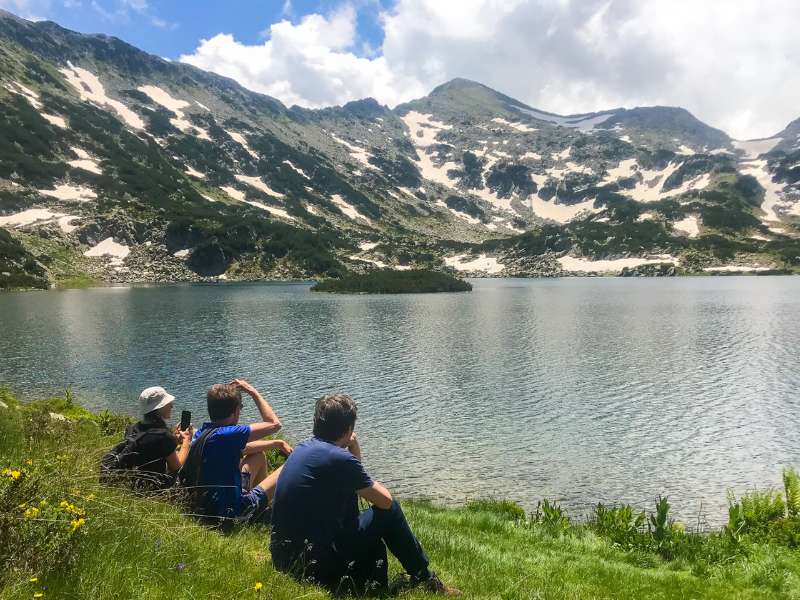
Mountains can teach us how to enjoy the journey, not just the destination.
Before, I hurried about the mountain, not caring about the journey, only wanting to reach the summit. But we spend most of the time on the journey itself, not at the destination.
When I started taking time to enjoy the journey up the mountain and not just the summit, I started enjoying hiking MUCH more.
I also realized that I was doing the same thing in my career – so focused on the next step that I didn’t stop and appreciate where I currently was.
When We’re not trying to conquer mountains, they can make us aware of our thoughts.
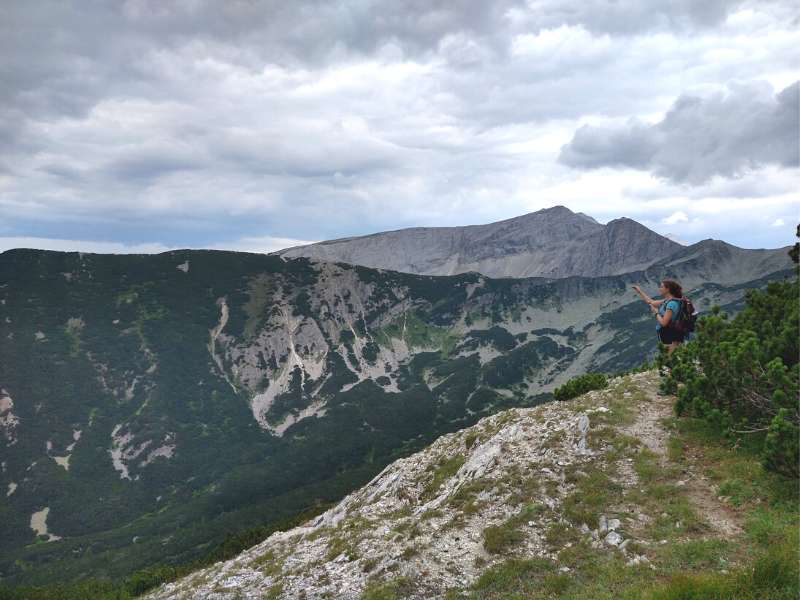
We think 60,000 thoughts a day, most of them on autopilot. When we’re hiking, we can become of these thoughts and see if they serve us.
For example, if you’re climbing a really steep section and your first thought is, “Ughhh, I’m so out of shape, I’m never going to get there,” that’s going to make your hike much less enjoyable than if you changed it to “Wow, I”m making good progress, so I’m going to take a minute to stop and enjoy the beautiful views that I have already.”
Hiking is such a good time to practice this since you don’t have all the distractions of everyday life.
Check out my article How Changing Your Thoughts Can Change Your Life + How to Practice While Hiking for more info on this, plus a practical exercise you can practice on your next hike.
Climbing up mountains makes us realize we’re capable of so much more than we think we are.
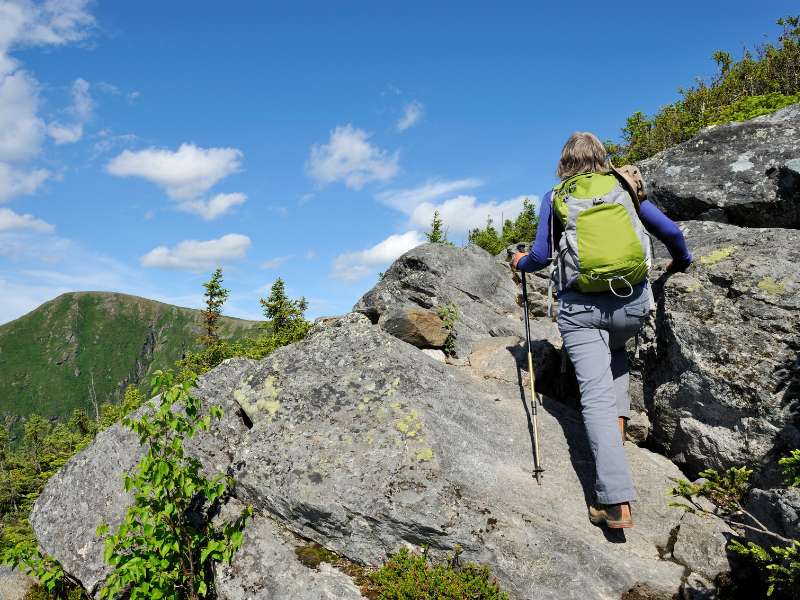
If you do a hard hike, at some point, you’ll question why you’re doing it, especially since this is supposed to be “fun.” You may think you can’t make it and be tempted to give up.
But when you persist and keep going despite feeling like your lungs are on fire and make it to the top, you feel unbeatable, like nothing can stop you. And that strength carries over to your everyday life too.
When you’re faced with a challenge, and your first thought is, “I can’t.” You’ll be reminded of the time you thought the same while climbing a mountain but persisted and realize that you’ve got this. While it may be a challenge, you can do it!
This was especially true for me when I did my first multi-day hike, the Tour du Mont Blanc. I had just had surgery and was having more right after my hiking tour was finished.
I was physically weak but gained so much mental strength that years later, I still think, If I could do the TMB, I can do …(whatever challenge it is that I’m facing).
Mountains teach us humility.
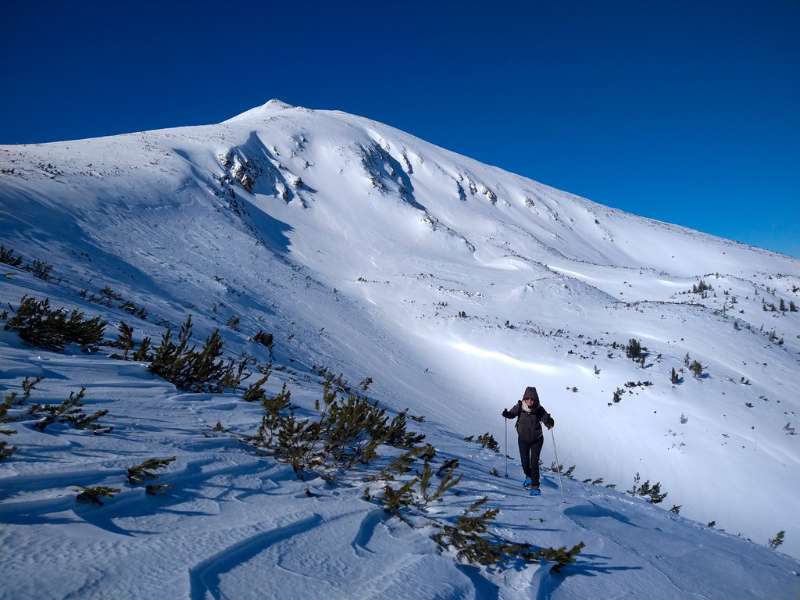
Sometimes we’ve chosen to hike a bigger mountain than our physical strength allows. Or we’re much slower than we had anticipated, so we need to turn around to avoid hiking in the dark.
Or Mother Nature decides to change in an instant, and blue skies now become gray as she hammers you with hail.
If you’ve done enough hikes, at some point, you’ll have to turn around. In my previous way of thinking, I would have thought this “defeat.”
Now, I realize it’s a lesson in letting go. In realizing many things are out of our control, we can only control how we react to them.
Hiking in winter is an especially good teacher of humility. Hiking plans will often go array due to snow, avalanche or temperature conditions. It happened to me a few weeks ago when we were planning an overnight hike in the Pirin Mountains in Bulgaria. And I have no doubt it will happen to me again, at least once more, before the season is over.
So rather than being grumpy about it the rest of the day as I would have been before, I try to accept it for what it is and even try to make the best of it, like now I have the time and energy for a stop at the hot springs to warm up.
And isn’t life more enjoyable when we learn to accept the things we can’t control rather than getting upset about them?
Mountains show us the gifts of being connected to nature.
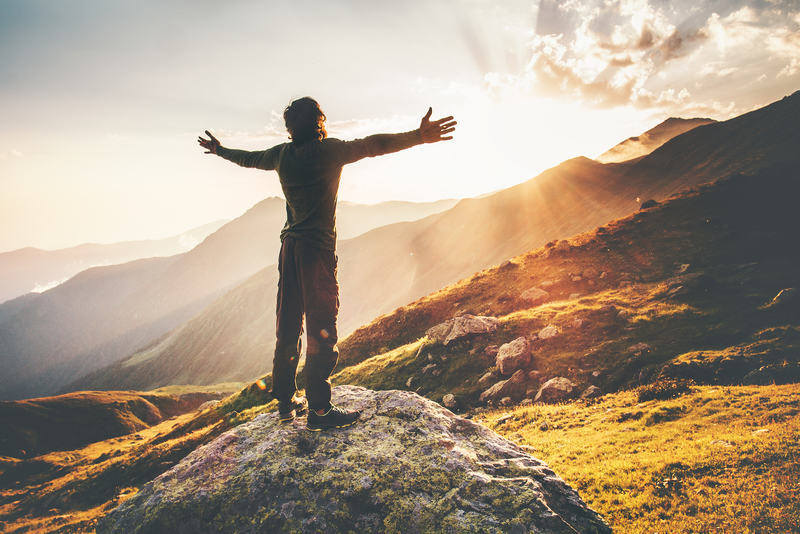
Many of us live in big cities without a lot of nature at our doorsteps. I
We don’t even realize how disconnected we’ve become from nature until we immerse ourselves in it. A research study from Berkley suggests we have become more and more distanced from nature and its life-giving benefits.
That is, until we hike and hear a beautiful bird song – and realize we have no idea what species it is. Or we hear a strange sound from the forest and wonder if it’s a deer – and then realize we don’t even know if there are deer in this particular forest.
The mountains showed me how disconnected I was from nature, even while I was working at a zoo and living close to the Canadian Rockies.
And they showed me how much better I feel when I’m connected – so much so that it played a big part in why I moved to the town of Bansko in Bulgaria, at the foot of the Pirin Mountains.
By taking a more mindful approach, rather than trying to conquer mountains that can’t be conquered no matter how good of a fight we put up, we can gain greater insights into ourselves and into the natural world in which we live.
And into the beautiful gifts the mountain has to offer us – if we lay down our swords.
I invite you to lay down your sword with me, and share this post with someone else who you think would benefit from no longer conquering mountains.
